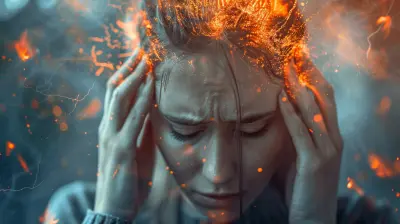Understanding Emotional Triggers and How to Heal Them
3 June 2025
Have you ever found yourself suddenly overwhelmed with emotions because of a simple comment, a familiar scent, or even a song on the radio? You're not alone. These reactions are called emotional triggers, and they can bring up pain from past experiences without warning.
But the good news? You don’t have to stay trapped in these emotional loops forever. Healing is possible. In this article, we’ll dive into what emotional triggers are, why they happen, and most importantly, how you can heal and regain control of your emotions. 
What Are Emotional Triggers?
Emotional triggers are deep-seated psychological responses to specific stimuli. They can stem from past experiences, traumas, or unresolved issues. When triggered, you may feel a rush of intense emotions—anger, fear, sadness, or frustration—often out of proportion to the situation.These responses aren’t random. They’re your brain’s way of warning you that something in the present moment reminds you of a painful past experience. However, while your brain thinks it's protecting you, reacting impulsively to triggers can negatively impact your relationships, self-esteem, and mental health. 
Common Emotional Triggers
Everyone’s triggers are unique, but certain themes tend to be universal. Here are some common emotional triggers:1. Rejection or Abandonment
If you've ever felt left out, ignored, or unwanted, situations that resemble past rejection can trigger deep emotional pain.2. Criticism or Judgment
Even constructive criticism can feel like a personal attack if you were often judged harshly as a child.3. Feeling Unloved or Unappreciated
When you don’t feel valued, it can trigger unresolved childhood wounds related to self-worth and validation.4. Loss of Control
Situations where you feel powerless can bring up anxiety, especially if you’ve experienced past trauma or unpredictability.5. Betrayal or Dishonesty
If you've been deceived before, lies or betrayals can stir up fear and insecurity.
Why Do We Get Triggered?
Your brain is wired for emotional survival. When you experience something traumatic or painful, your mind stores that memory as a warning. The next time you encounter a similar situation, your brain sends an emotional alarm, urging you to avoid potential harm.Think of it like touching a hot stove—after you burn your hand once, your brain remembers, and the next time you get near a stove, you instinctively pull away. Emotional triggers work the same way, except instead of physical pain, they activate emotional distress.
While this mechanism is meant to protect us, it can sometimes become overactive, making us react to situations that don’t actually pose a threat. That’s why healing is essential. 
How to Heal Emotional Triggers
Healing emotional triggers isn’t about avoiding them altogether—it’s about learning to respond rather than react. Here’s how you can start healing:1. Identify Your Triggers
Before you can change your response, you need to recognize what sets you off. Pay attention to moments when you feel irrationally emotional. Ask yourself:- What just happened?
- What emotions am I feeling?
- Have I felt this way before?
Over time, you'll notice patterns, and these patterns will reveal your triggers.
2. Pause and Breathe
When a trigger hits, don’t react immediately. Instead, pause and take deep breaths. This simple action signals your nervous system to calm down, giving you control over your reaction.Try this: Inhale for four seconds, hold for four seconds, and exhale for four seconds. Repeat until you feel calmer.
3. Challenge Negative Thoughts
Triggers often bring up old, limiting beliefs like:- "I’m not good enough."
- "People always leave me."
- "I can’t trust anyone."
Instead of accepting these thoughts as truth, challenge them:
- Is this thought based on facts or just emotions?
- What’s a healthier way to look at this situation?
Reframing your perspective can weaken the power of your triggers.
4. Practice Self-Compassion
Healing is a journey, and setbacks happen. Instead of criticizing yourself, practice self-kindness. Talk to yourself the way you'd talk to a friend going through a tough time.Replace harsh self-talk with gentle affirmations:
- "I’m allowed to feel hurt, but I don’t have to stay stuck."
- "I am healing, and that takes time."
- "My past does not define me."
5. Heal Your Inner Wounds
Triggers often stem from unresolved childhood wounds. Addressing these wounds will help you break free from their influence. Journaling, therapy, or even talking to someone you trust can help you process past pain.Try writing:
- What past experience does this trigger remind me of?
- How did it shape my beliefs about myself?
- How can I rewrite this story in a healthier way?
6. Set Healthy Boundaries
If certain people or situations repeatedly trigger you, it’s okay to set boundaries. Protecting your peace isn’t selfish—it’s essential.For example:
- If someone constantly criticizes you, limit your time with them.
- If social media triggers self-doubt, take breaks.
- If a relationship feels toxic, consider if it’s worth maintaining.
Protecting your energy is part of healing.
7. Focus on the Present Moment
Most triggers pull us into the past, causing emotional reactions based on old wounds. Practicing mindfulness helps you stay present and respond logically rather than emotionally.Try grounding techniques like:
- Noticing five things you see, four things you touch, three things you hear, two things you smell, and one thing you taste.
- Focusing on your breath.
- Acknowledging your emotions without letting them control you.
8. Seek Professional Support
Sometimes, deep emotional wounds need professional guidance. Therapists can help you process trauma, reframe negative thoughts, and develop coping skills. Seeking help is a sign of strength, not weakness.Final Thoughts
Emotional triggers can feel overwhelming, but they don’t have to control your life. By understanding your triggers, practicing self-awareness, and taking active steps to heal, you can free yourself from old wounds and step into emotional freedom.Healing is a journey—one that requires patience, self-love, and inner work. But every step forward, no matter how small, is progress. You are capable of healing, growing, and thriving.
So the next time you feel triggered, take a deep breath and remind yourself: You are stronger than your past.
all images in this post were generated using AI tools
Category:
Emotional HealingAuthor:

Eliana Burton
Discussion
rate this article
2 comments
Angie Henderson
Unraveling emotional triggers reveals hidden truths; healing them unlocks a journey within you yet to be discovered.
June 13, 2025 at 3:00 AM

Eliana Burton
Thank you for your insightful comment! I completely agree—unpacking emotional triggers is essential for personal growth and healing. It truly opens up new paths for self-discovery.
Andrea McIntyre
This article offers valuable insights into emotional triggers, blending theory and practical advice. It encourages self-reflection and healing, making it a beneficial read for those seeking personal growth.
June 8, 2025 at 4:42 PM

Eliana Burton
Thank you for your thoughtful feedback! I'm glad you found the insights helpful for personal growth.


